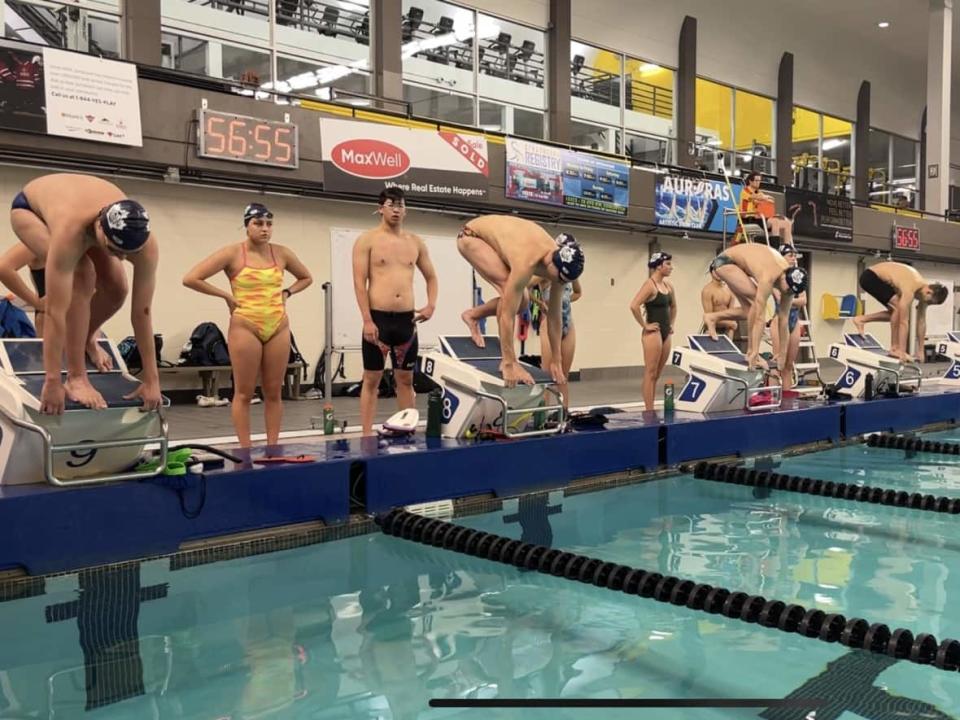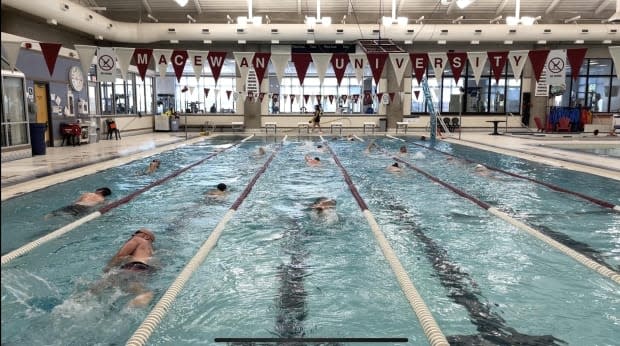Treading water: Edmonton swim clubs struggle to find pool time amid closures

Edmonton swim clubs are struggling to find time for their athletes to train after the closures of four major pool facilities since the start of the COVID-19 pandemic.
The Olympian Swim Club, one of Edmonton's largest competitive swimming clubs, has lost all four of its main training pools.
Club president Jared Buhler said it's put the whole club in a tricky position.
"It's been crisis after crisis after crisis paired with COVID," Buhler said.
The first to go was the pool at the Northern Alberta Institute of Technology in July of 2020. Citing financial pressures and low usage, NAIT announced the pool would be closed permanently.
In June 2021, the pool at the city's Peter Hemingway Fitness and Leisure Centre closed for renovations. Phase 1 of the work is underway and expected to be completed in spring 2023.
Phase 2 rehabilitation work is planned but not yet funded, a city spokesperson said. If the budget gets approved, construction is planned for 2023-26, with full completion in 2026. If the funding does not get approved, the Peter Hemingway pool would reopen in 2023, and Phase 2 work would be paused.
In May of this year, St. Albert's Fountain Park pool shut down for renovations. In August, the City of St. Albert announced that a significant structural issue had been discovered.
St. Albert officials say the pool is now expected to reopen in the summer of 2023.
In August, Edmonton city council voted to close Scona Pool permanently due to the growing costs of repairs.
Buhler said the Olympian Swim Club was able to pick up the pieces, at the cost of cutting back its developmental program.
"That's where the heaviest demand is right now city-wide," he said.
"There's a shortage of programs for learning to swim and developmental swimming programs," he said. "We just simply can't find pool space for it right now."
The club has lost more than 50 swimmers. Some left during the early days of the pandemic and haven't returned.
Others left after the club was forced to make changes to adapt to the pool closures.
"Just getting lane space is not the answer because people need lane space that's geographically convenient for their situation," Buhler said.
"We can close a program at Scona, and you know, perhaps move it to Clareview, but the Scona people won't be able to necessarily make that move."

Making Waves Aquatic Club is also struggling to keep its swimmers in the water.
As a swimming and water polo club, it has specific requirements for the size and depth of a pool, which leaves few options.
Secretary Corey Conroy says after training at NAIT for over 15 years, they've had to start from scratch.
He cold-called pools across the city, eventually finding space at MacEwan University.
"We're still kind of feeling that struggle now with all of the pools that just decided not to open after the pandemic," Conroy said.
"It puts a lot of constraints on being able to find space ... but space that makes sense and space that works for members."
Conroy said the club lost about half of its members due to scheduling changes. That hurt the club's goal of building a full roster of water polo players, he said.
"I think every club's mandate is to grow the sport — not necessarily our membership, it's to grow the sport. So seeing pools close is making it a bit more challenging because now we're just really overtaxing an already taxed system."
After city council voted in August to close the Scona pool, the city said it will work with affected schools, swim teams and rental groups to explore booking times at other recreation centres.
In a Sept. 13 statement to CBC News, City of Edmonton spokesperson Christopher Webster said city staff have connected with the majority of groups that use Scona pool to begin the process of finding alternative facilities for their programs.
"While this process may take some time, we remain committed to working closely with each partner at this time," Webster said.

 Yahoo Sports
Yahoo Sports 
